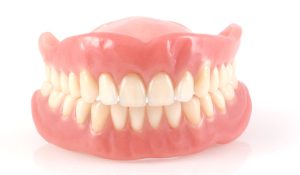Dental Clinic | Ang Mo Kio, Bedok, Jurong East, Tampines – Dental Implants & Oral Care Singapore
Problem with dentures and what you can do
Problem with dentures and what you can do

What are the common problems with dentures?
1. Reduced retention
Full dentures are fitted on the jaw via suction because there is an absence of teeth to secure the dentures. Hence, it takes very little pressure to dislodge full dentures, causing them to move when biting into an apple or similar hard substances.
2. Unsightly clasp
Unlike full dentures, partial dentures require metal clasps to retain the dentures in the mouth. Clasps are usually placed on the most posterior tooth so that they are not visible when you smile. However, if most of your teeth are missing, a clasp will then be placed at a tooth nearer to the front, making it more visible.
3. Food trapped and smell
When your dentures are unstable, food can be trapped under the base of the denture (between the denture and gums), resulting in discomfort. If food is not rinsed out, this will result in bad breath. Furthermore, there are corners under the contour of teeth that cannot be filled by a denture, known as an undercut. Food can also be trapped in these spaces and lead to bad breath.
4. Poor smile
With dentures being made of plastic, they can wear down faster than natural teeth, giving the wearer a reverse smile.
So are dentures a terrible option?
Of course not! Dentures are still acceptable in modern dentistry. It is a simple, inexpensive treatment, and it is not invasive as opposed to other options. There are also various steps which can be taken to solve the problems with dentures. These steps are included below:
So are dentures a terrible option?
Of course not! Dentures are still acceptable in modern dentistry. It is a simple, inexpensive treatment, and it is not invasive as opposed to other options. There are also various steps which can be taken to solve the problems with dentures. These steps are included below:
Solutions to common problems with dentures
1. Solutions for reduced retention
I. Regular checks and replacements
Dentures are unable to last forever. Once teeth are extracted, the jawbone will start to shrink (resorb). This resorption process happens slowly but with denture wearing, the bone resorption speeds up due to the pressure applied to the bone while wearing dentures. Therefore, we cannot expect dentures to perfectly fit the jawbone forever. To prevent this, dentures should be checked annually and replaced if they are ill-fitting. Dentures need to be relined as well every two to three years and be replaced every five to eight years. Otherwise, a poor fitting denture can cause greater bone loss. A proper denture will then take at least four to five visits to complete. Thus, taking proper steps will ensure a more retentive denture.
II. Dental Implants
Dentures can also be retained via an implant, where there is a reliance on clips to hold the denture onto the implant. Multiple implants (four to five) can be placed to help retain a fixed bridge. The denture is still removable for cleaning but with implants, the retention is sufficient to prevent dislodging of dentures, especially when consuming hard foods.
2. Solutions for unsightly clasps
For replacement of one to two missing teeth, a flexible denture composed of nylon is used and clasps are made to match the colour of gums. There nylon clasps will be less obvious. Implants can also be used to remove clasps as they can be strategically placed to secure the removable partial denture. This is a relatively inexpensive and straightforward treament.
3. Solutions for food trapped and smell
Proper oral hygiene routine and ensuring that dentures fit properly will help to reduce this problem. Some tips for proper hygiene include:
• Your dentures can be removed after every meal and rinsed or even brushed
• Besides regular tooth brushing use an interdental dental brush to brush the sides of teeth next to your missing tooth space. Flossing should be done between spaces of your teeth.
• Surfaces of the denture must be cleaned twice a day, after removal and should not be worn at night.
• Stains can be removed via whitening tablets.
• Have regular dental checks to assess health of the mucosa (denture-supporting tissue)
4. Solutions for poor smile
Dentures should be remade as mentioned previously to reduce wear of the denture teeth or else this can result in a less visually appealing smile. Remaking dentures can help to maintain a more youthful smile.
Overall, dentures are still a good option to replace missing teeth if one takes the necessary steps for proper care and upkeep. If you are still hesitant on getting dentures or want to explore other options, feel free to feel free to contact us at 1728 Dental to book a consultation:
1728 Dental@AMK: +65 9631 1728
1728 Dental @Bedok Central: +65 8764 1728
1728 Dental@Jurong East: +65 9770 1728
1728 Dental@Tampines: +65 9725 1728
Alternatively, you may WhatsApp us at:
















